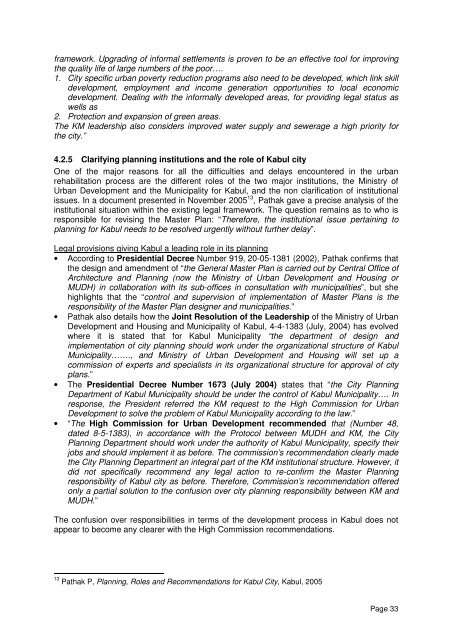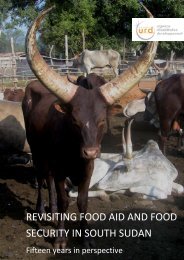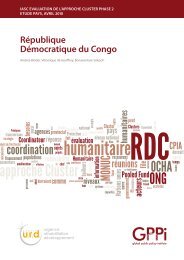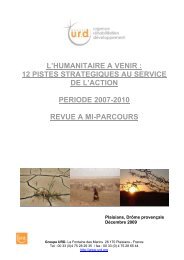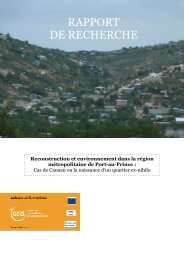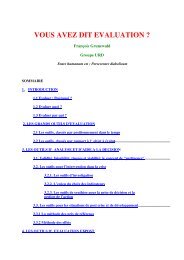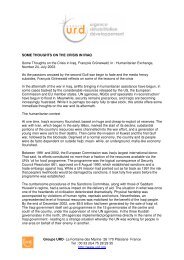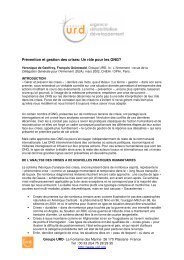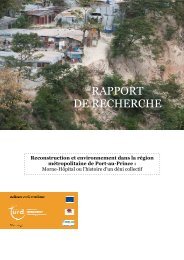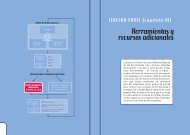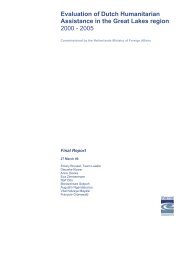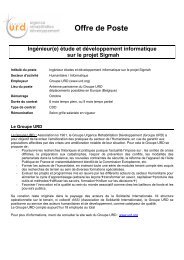Kabul Urban Survey - Groupe URD
Kabul Urban Survey - Groupe URD
Kabul Urban Survey - Groupe URD
You also want an ePaper? Increase the reach of your titles
YUMPU automatically turns print PDFs into web optimized ePapers that Google loves.
framework. Upgrading of informal settlements is proven to be an effective tool for improving<br />
the quality life of large numbers of the poor….<br />
1. City specific urban poverty reduction programs also need to be developed, which link skill<br />
development, employment and income generation opportunities to local economic<br />
development. Dealing with the informally developed areas, for providing legal status as<br />
wells as<br />
2. Protection and expansion of green areas.<br />
The KM leadership also considers improved water supply and sewerage a high priority for<br />
the city.”<br />
4.2.5 Clarifying planning institutions and the role of <strong>Kabul</strong> city<br />
One of the major reasons for all the difficulties and delays encountered in the urban<br />
rehabilitation process are the different roles of the two major institutions, the Ministry of<br />
<strong>Urban</strong> Development and the Municipality for <strong>Kabul</strong>, and the non clarification of institutional<br />
issues. In a document presented in November 2005 13 , Pathak gave a precise analysis of the<br />
institutional situation within the existing legal framework. The question remains as to who is<br />
responsible for revising the Master Plan: “Therefore, the institutional issue pertaining to<br />
planning for <strong>Kabul</strong> needs to be resolved urgently without further delay”.<br />
Legal provisions giving <strong>Kabul</strong> a leading role in its planning<br />
• According to Presidential Decree Number 919, 20-05-1381 (2002), Pathak confirms that<br />
the design and amendment of “the General Master Plan is carried out by Central Office of<br />
Architecture and Planning (now the Ministry of <strong>Urban</strong> Development and Housing or<br />
MUDH) in collaboration with its sub-offices in consultation with municipalities”, but she<br />
highlights that the “control and supervision of implementation of Master Plans is the<br />
responsibility of the Master Plan designer and municipalities.”<br />
• Pathak also details how the Joint Resolution of the Leadership of the Ministry of <strong>Urban</strong><br />
Development and Housing and Municipality of <strong>Kabul</strong>, 4-4-1383 (July, 2004) has evolved<br />
where it is stated that for <strong>Kabul</strong> Municipality “the department of design and<br />
implementation of city planning should work under the organizational structure of <strong>Kabul</strong><br />
Municipality……., and Ministry of <strong>Urban</strong> Development and Housing will set up a<br />
commission of experts and specialists in its organizational structure for approval of city<br />
plans.”<br />
• The Presidential Decree Number 1673 (July 2004) states that “the City Planning<br />
Department of <strong>Kabul</strong> Municipality should be under the control of <strong>Kabul</strong> Municipality…. In<br />
response, the President referred the KM request to the High Commission for <strong>Urban</strong><br />
Development to solve the problem of <strong>Kabul</strong> Municipality according to the law.”<br />
• “The High Commission for <strong>Urban</strong> Development recommended that (Number 48,<br />
dated 8-5-1383), in accordance with the Protocol between MUDH and KM, the City<br />
Planning Department should work under the authority of <strong>Kabul</strong> Municipality, specify their<br />
jobs and should implement it as before. The commission’s recommendation clearly made<br />
the City Planning Department an integral part of the KM institutional structure. However, it<br />
did not specifically recommend any legal action to re-confirm the Master Planning<br />
responsibility of <strong>Kabul</strong> city as before. Therefore, Commission’s recommendation offered<br />
only a partial solution to the confusion over city planning responsibility between KM and<br />
MUDH.”<br />
The confusion over responsibilities in terms of the development process in <strong>Kabul</strong> does not<br />
appear to become any clearer with the High Commission recommendations.<br />
13 Pathak P, Planning, Roles and Recommendations for <strong>Kabul</strong> City, <strong>Kabul</strong>, 2005<br />
Page 33


